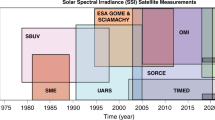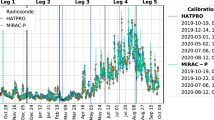Abstract
AN article by Kaplan1 suggested a method of obtaining indirectly the temperature profile of the atmosphere by measuring from a satellite the radiances at several wavelengths in the 15-µ band of carbon dioxide. To test the practical application of this proposal the U.S. Weather Bureau has developed a grating spectrometer2 with fixed exit slits and detectors to measure simultaneously the radiances in 5 cm−1 intervals centred at 669, 677.5, 691, 697, 703 and 709 cm−1 and a 7 cm−1 interval centred at 899 cm−1.
This is a preview of subscription content, access via your institution
Access options
Subscribe to this journal
Receive 51 print issues and online access
$199.00 per year
only $3.90 per issue
Buy this article
- Purchase on Springer Link
- Instant access to full article PDF
Prices may be subject to local taxes which are calculated during checkout
Similar content being viewed by others
References
Kaplan, L. D., J. Opt. Soc. Amer., 49, 1004 (1959).
Dreyfus, M. G., and Hilleary, D. T., Aerospace Engineering, 21, No. 2, 42 (1962).
Hagemann, F., Gray, jun., J., Machta, L., and Turkevich, A., Science, 130, 542 (1959).
Author information
Authors and Affiliations
Rights and permissions
About this article
Cite this article
HILLEARY, D., WARK, D. & JAMES, D. An Experimental Determination of the Atmospheric Temperature Profile by Indirect Means. Nature 205, 489–491 (1965). https://doi.org/10.1038/205489b0
Published:
Issue Date:
DOI: https://doi.org/10.1038/205489b0
This article is cited by
-
Inverse problems of satellite meteorology
Pure and Applied Geophysics PAGEOPH (1968)
Comments
By submitting a comment you agree to abide by our Terms and Community Guidelines. If you find something abusive or that does not comply with our terms or guidelines please flag it as inappropriate.



